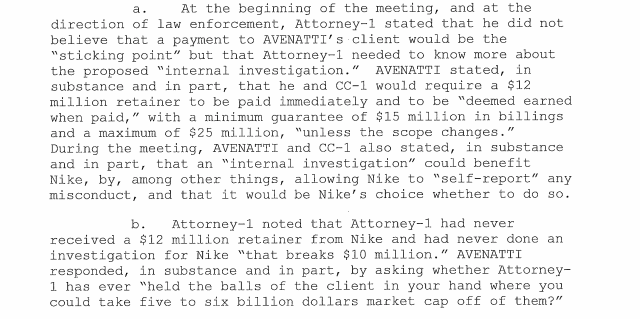Federal prosecutors in New York have charged celebrity attorney Michael Avenatti with trying to extort $20 million from Nike by threatening to vent allegations that he threatened would knock billions off its market capitalization. A simultaneous federal indictment in California charges Avenatti with embezzling from a client and defrauding a bank. [Chris Dolmetsch and Erik Larson, Bloomberg]
Two tweets 47 minutes apart tell quite a story [Joe Weisenthal] The complaint filed in New York also describes an unnamed co-cpnspirator, who is not charged with any wrongdoing; Wall Street Journal reporting says that figure is California-based celebrity attorney Mark Geragos, a longtime Overlawyered favorite who has lately represented Jussie Smollett and Colin Kaepernick and until this week was billed as a legal commentator at CNN, where Avenatti too has made frequent guest appearances.
As in many other situations, the question arises: what would the legal difference be between extortion and ordinary lawyer behavior in settlement negotiations? Part of the answer is that Avenatti was alleged to be angling for his own, rather than the client’s advantage. From p. 9 of the New York complaint:
Comments Jeb Kinnison on Twitter: “Must observe the forms. If only he’d started a nonprofit to take the payoffs and pay him a salary…” And another reader is reminded of the 2013 Paula Deen episode [American Thinker, earlier]

